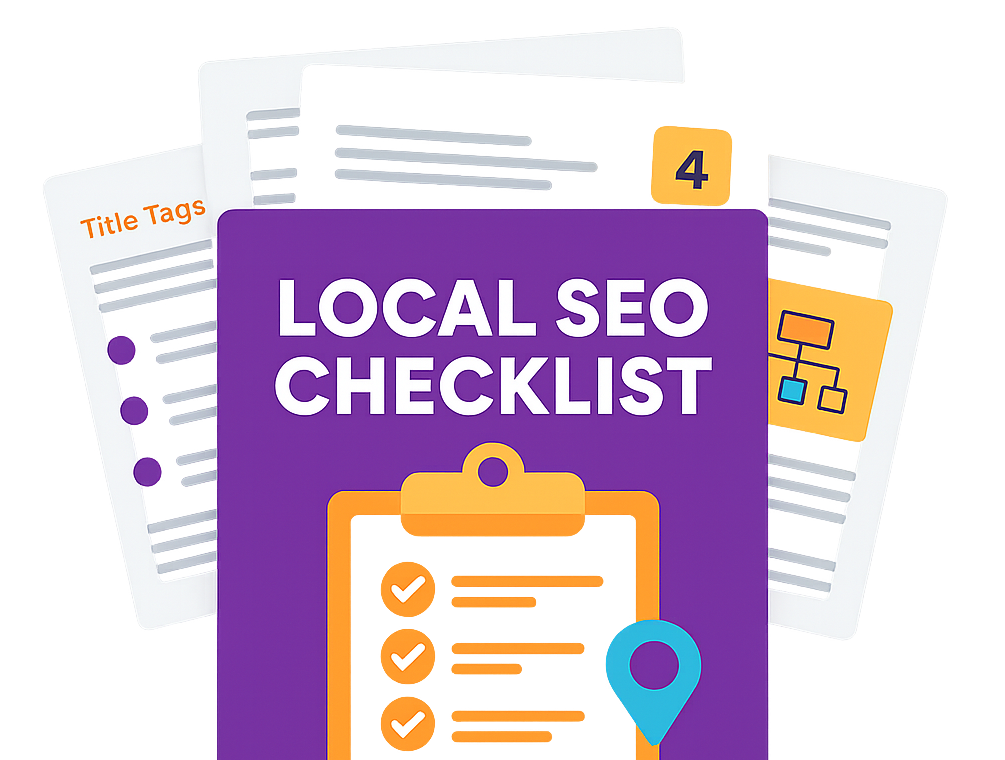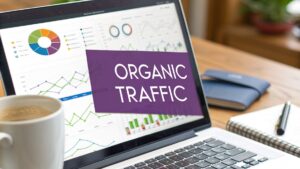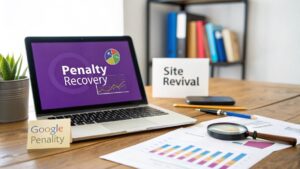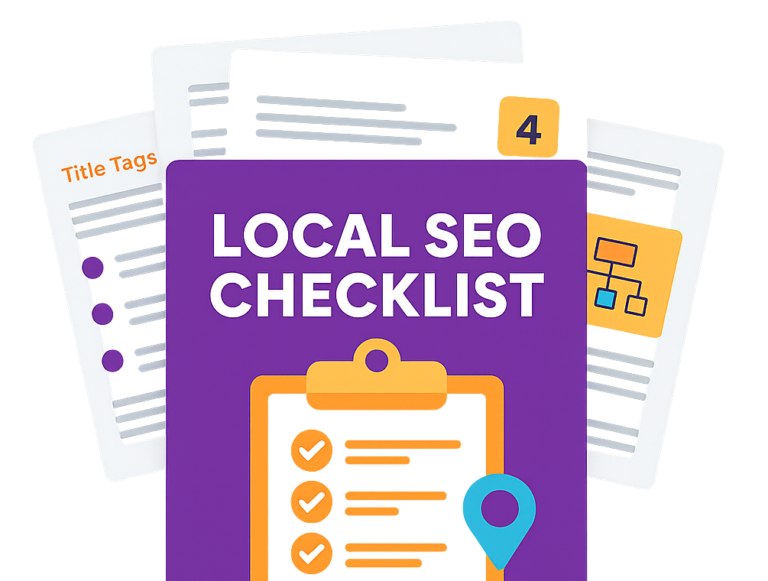Let's clear up one of the most common bits of jargon in digital marketing: the difference between SEM and SEO.
It’s actually pretty simple. Search Engine Marketing (SEM) is the entire discipline of using search engines to find new customers. Search Engine Optimisation (SEO) is one specific part of that discipline.
Think of SEM as the complete toolkit for getting seen on Google. Inside that box, you’ve got two main tools: SEO and paid advertising.
SEM vs SEO: Defining The Core Concepts
Here in the UK, many business owners use the term "SEM" when they're really just talking about paid ads, like the ones you run with Google Ads. While paid search is a massive part of the picture, the true definition of Search Engine Marketing (SEM) is much broader. It covers every single activity—both paid and organic—that helps you show up when someone searches online.
So, SEM is officially made up of two key pillars:
- Search Engine Optimisation (SEO): This is the craft of improving your website so it earns higher rankings in the organic (unpaid) search results. It’s a long-term game focused on building trust and authority with search engines.
- Paid Search (PPC): This is where you pay for ads to appear right at the top of the search results page. It gives you instant visibility, but only for as long as you keep paying.
For most UK businesses, the real decision isn't "SEM or SEO?" but rather, "Should we invest in organic growth (SEO), paid visibility (PPC), or a smart mix of both?" Getting this balance right is crucial, and you can dive deeper into building a powerful campaign in our guide to search engine marketing strategies.
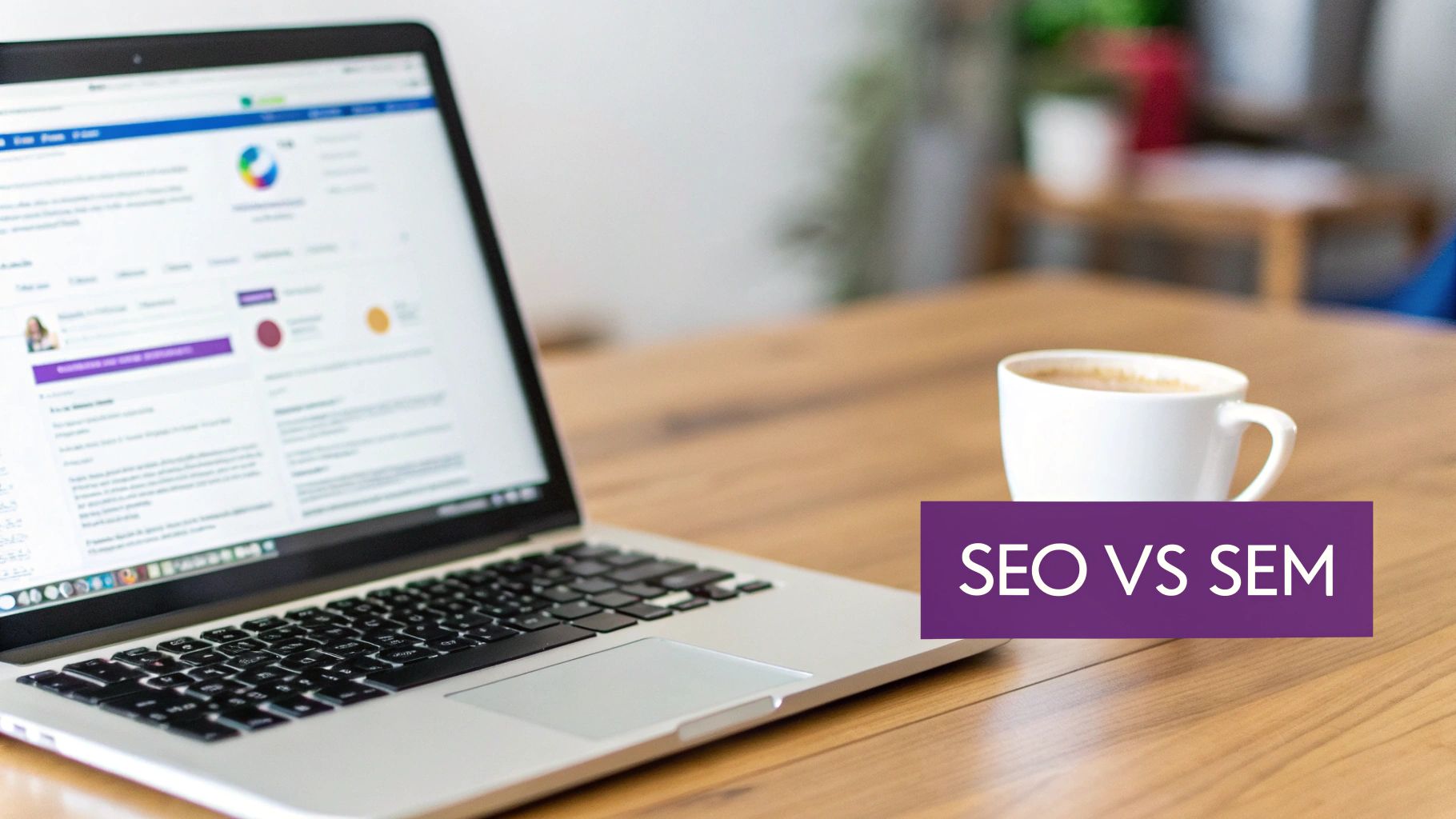
At a Glance: SEO vs Paid Search (PPC)
To really get to grips with the practical differences, it helps to see the two main parts of SEM side-by-side. This table breaks down what you need to know.
| Aspect | SEO (Organic Search) | Paid Search (PPC) |
|---|---|---|
| Speed to Impact | Slower, typically takes 4-12 months to see results | Immediate, often within hours of launching |
| Cost Structure | Investment in resources (time, expertise, content) | Direct ad spend (£ per click) |
| Longevity | Builds lasting, cumulative value over time | Visibility stops the moment you stop paying |
| Placement | Organic results just below the ads | Top of the page (marked "Sponsored") |
| User Trust | Generally higher user trust and click-through rates | Can be seen as purely commercial |
The critical takeaway for any business owner is that SEO builds a sustainable digital asset over time, whereas paid search rents temporary visibility. One is a marathon, the other is a sprint.
It's clear that UK businesses recognise the immense value of this long-term approach. Recent data shows that 77% of companies are actively investing in SEO to improve their organic search presence. This commitment highlights just how vital SEO is for building a resilient online brand that can stand the test of time.
Comparing the Core Mechanics of SEO and SEM
To really get to grips with the difference between SEO and SEM, we need to look past the simple definitions. It's the day-to-day mechanics—how each one actually works—that will help you make the right call for your business. Let's break down the practical differences.
First, take a look at a typical search results page. You'll see a clear split between the paid ads at the very top and the organic results just below.
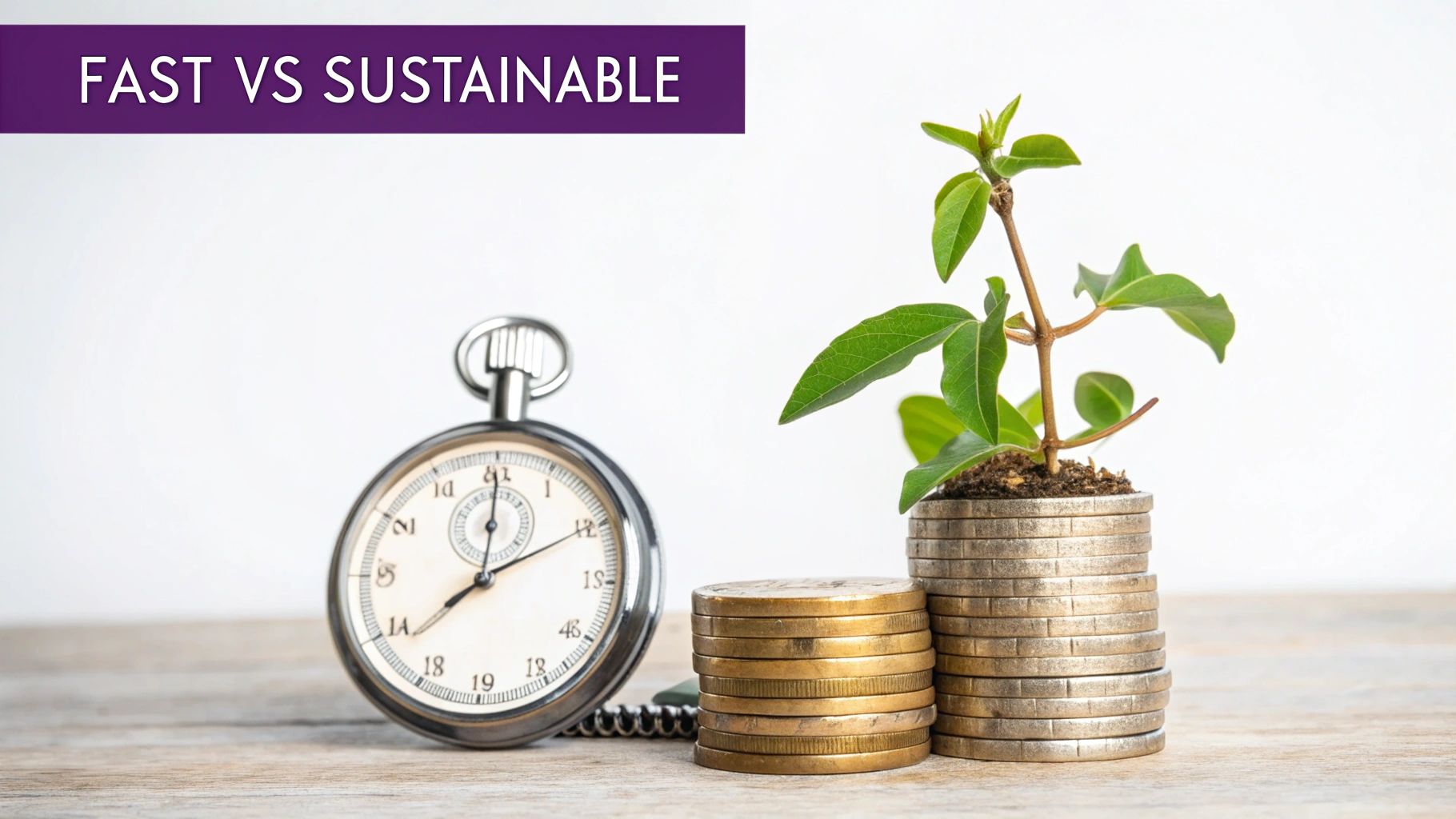
This visual divide is the most basic difference in how users see SEO and paid search, and it has a massive impact on trust and who gets the click.
Speed to Impact
The most dramatic contrast between the two is speed. A well-built paid search campaign can start funnelling traffic to your website almost instantly—often within a few hours of going live. You pick your keywords, set a budget, and your ads can show up at the top of the page straight away.
This is perfect for time-sensitive promotions, product launches, or any new business that needs to generate leads right now. If a Cambridgeshire café wants to push a new weekend brunch menu, PPC gets them in front of local searchers immediately.
SEO, on the other hand, is a long game. Building the authority and relevance you need to rank organically is a slow-burn process. You're typically looking at four to twelve months before you see significant, steady results. Think of it as an investment in your digital future, not a switch you can just flick on.
Cost Structure and Investment
The way you pay for SEO and paid search couldn't be more different. Paid search runs on a direct cost-per-click (CPC) model. Every time someone clicks your ad, you pay a fee, which can be anything from £0.50 to over £50. Your visibility is directly tied to how much you're willing to spend.
With SEO, you're not paying for clicks. Instead, your investment goes into resources:
- Expertise: The time and skill of SEO specialists to handle audits, research, and strategy.
- Content Creation: Developing quality blog posts, guides, and pages that genuinely help your target audience.
- Technical Optimisation: Making sure your website's backend is clean and easy for search engines to crawl. This part is critical, and you can learn more about what is technical SEO and how it affects your site's performance.
- Outreach: Building relationships to earn backlinks from reputable sites, which boosts your website's authority.
The core financial distinction is this: with paid search, you are renting traffic. With SEO, you are investing in a digital asset that generates its own traffic over time.
SERP Placement and Visibility
As you saw in the screenshot, paid and organic results have their own distinct spots on the search engine results page (SERP).
Paid ads, clearly marked with a "Sponsored" label, get the premium real estate at the very top of the page (and sometimes the bottom). It's a guaranteed way to be seen, for as long as your budget holds out.
Organic SEO results slot in right below the ads. While they might not have the top spot by default, users often trust these listings more, seeing them as more authentic. Earning a top organic position means Google itself has stamped your content as highly relevant and valuable.
Long-Term Sustainability
This is where the strategic trade-offs really come into focus. The visibility you get from a paid search campaign is fleeting. The second you pause your campaign or the budget runs dry, your ads vanish. The traffic stops. It’s a tap you have to keep paying to leave open.
SEO, however, builds lasting, sustainable value. The authority, rankings, and traffic you build up over time become a durable asset for your business. A well-ranking article can keep bringing in organic traffic for years with very little ongoing cost, creating a predictable and growing stream of leads. This cumulative effect is exactly why SEO is often called the most scalable long-term marketing channel.
Right, let's talk brass tacks. Moving from theory to actual figures is where the rubber meets the road when you're deciding where to put your marketing budget. Both SEO and paid search demand investment, but the way you spend that money and the returns you see couldn't be more different. Getting your head around these financial dynamics is the key to picking the right path for your business.
With paid search, the costs are direct and you feel them immediately. You're paying for every single click, and in a competitive market like the UK, that can add up faster than you'd think.
The Direct Costs of Paid Search
The average cost-per-click (CPC) on Google Search in the UK crept up to £2.58 in Q1 2025, a clear sign of the fierce competition for those top ad spots. But there's a reason for it: paid search is highly valued for its ability to deliver results you can actually measure. In fact, 70% of marketers say Google Ads gives them the best return out of all advertising platforms.
Your total spend is going to hinge on a few key things:
- Industry Competition: A local plumber in Cambridgeshire is going to pay a very different CPC compared to a national financial services firm.
- Keyword Value: High-intent keywords like "emergency boiler repair Cambridge" will always cost more than broader, informational terms.
- Management Fees: If you bring in an agency, you’ll also need to budget for their expertise in running your campaigns. This is usually a percentage of your ad spend or a flat monthly fee.
The return on investment (ROI) from paid search is most often tracked as Return on Ad Spend (ROAS). It's a straightforward calculation: for every £1 you put into ads, how much revenue do you get back? It's a fast, clean metric that really appeals to businesses that need to justify every pound spent.
Investing in Long-Term SEO Assets
The financial model for SEO is a completely different beast. You aren't paying for clicks; you're investing in building a valuable, long-term digital asset for your business.
With paid search, your visibility is rented. With SEO, it's owned. The moment you stop paying for ads, the traffic disappears. A strong organic ranking, however, can deliver traffic for years.
The main areas your SEO investment will go include:
- Content Creation: Developing high-quality articles, guides, and landing pages that actually attract and help your target audience.
- Technical Audits: Making sure your website is technically solid, fast, and easy for search engines to crawl and understand.
- Link-Building Outreach: Earning authoritative backlinks from other reputable websites to build your site's credibility and trust.
Because all these activities build on each other, the ROI for SEO is a much longer-term calculation. Initially, your cost-per-acquisition might seem high, but as your rankings become more established and organic traffic starts to flow, that cost steadily drops. For any business serious about organic search, it's vital to understand how to measure SEO ROI properly to justify the spend and show its long-term value.
It really is a marathon, not a sprint. To get a clearer picture of what to expect, our guide dives into how long SEO takes to work and the kind of results you can realistically anticipate.
Typical Investment and ROI Timelines
This table gives a general overview of the investment and timelines you might expect for both strategies.
| Strategy | Typical Monthly Investment (GBP) | Time to See Tangible ROI | Nature of ROI |
|---|---|---|---|
| Paid Search (PPC) | £500 – £5,000+ | 1-3 Months | Direct and measurable (ROAS), tied to immediate sales and leads. |
| SEO | £750 – £3,000+ | 6-12 Months | Cumulative and long-term, based on sustained organic traffic, brand authority, and a falling cost-per-acquisition. |
Ultimately, the right choice comes down to your business goals. If you need immediate, predictable returns to get things moving, paid search offers a clear and direct path. But if your focus is on building a sustainable, cost-effective marketing engine for the future, SEO is an investment that's hard to beat.
Which Strategy Is Right for Your Business Scenario?
Deciding between SEO and paid search isn't a simple technical choice. It's about matching the right tool to your specific business situation. The best strategy hinges entirely on your immediate needs, long-term goals, and the market you operate in. A generic pro-and-con list won't cut it—you need to see how these strategies play out in the real world.
To make the search engine marketing vs SEO debate truly practical, let's walk through a few common business scenarios. Seeing how each strategy fits can help you map your own objectives to the most effective path forward.
This decision tree gives you a quick visual on how to approach the core choice between immediate and long-term investment.
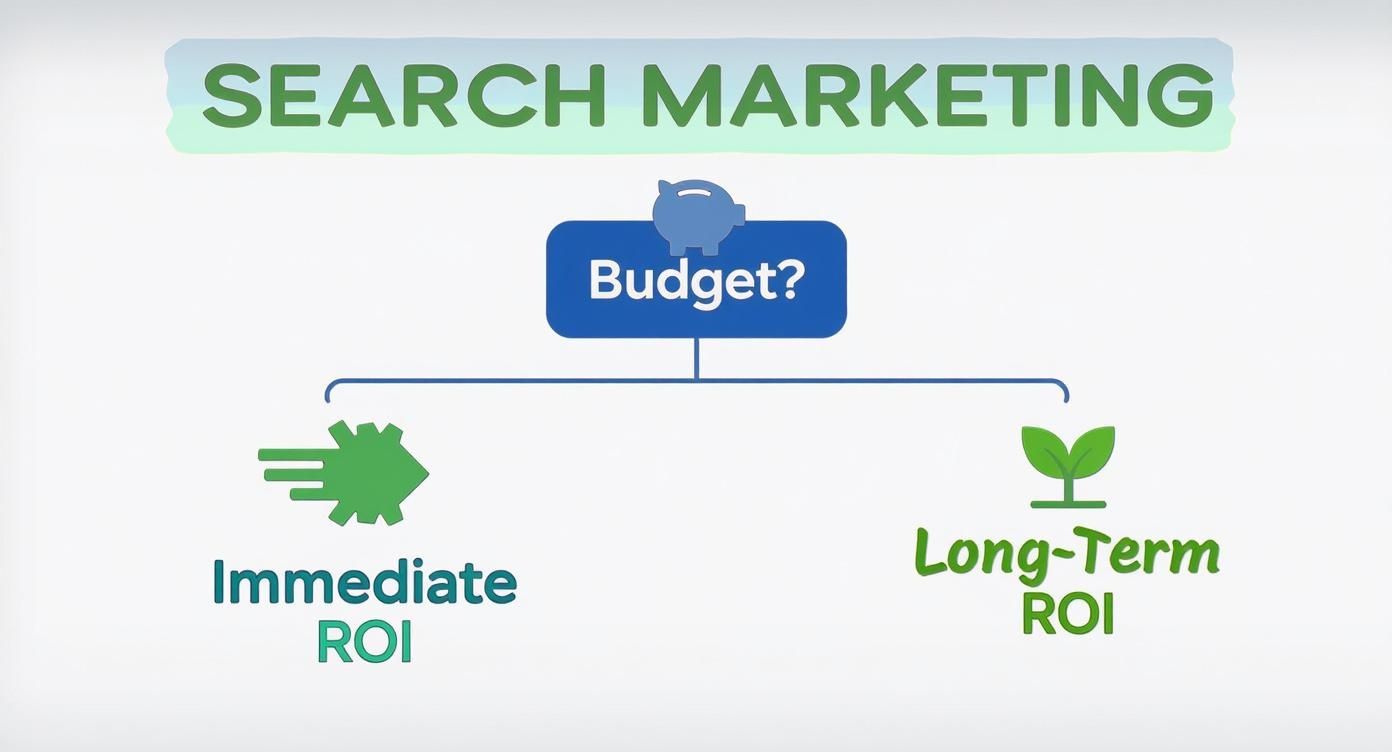
The main takeaway here is that your timeline and budget are the biggest factors. They'll naturally steer you towards either the instant results of paid ads or the sustainable growth that comes from organic search.
Scenario One: The New Local Business
The Situation: A new artisan bakery has just opened its doors in Bristol. They desperately need to get people through the door for their grand opening next weekend and make the local community aware they exist. Their budget is tight, and they have virtually no online presence.
The Recommendation: Geo-Targeted PPC Campaign
For this bakery, time is everything. A highly focused paid search campaign on Google Ads is the perfect solution. They can target specific keywords like "artisan sourdough Bristol," "new bakery near me," and "croissants BS1," making sure their ads only show up for people actively looking for their products within a few miles of their shop.
Paid search provides immediate, controllable visibility. You can turn on the campaign a week before opening, drive targeted local traffic to a simple landing page with your address and menu, and then switch it off once the launch buzz is over.
SEO would take months to gain any real traction, and by then, the crucial opening period would be a distant memory. PPC offers the speed and precision needed for a time-sensitive local launch.
Scenario Two: The Established E-commerce Brand
The Situation: An established online retailer selling sustainable home goods has been leaning heavily on paid ads for years. It's been profitable, but their cost-per-acquisition is creeping up. They're starting to realise their entire sales pipeline is vulnerable—if they stop paying for ads, their traffic dries up overnight. They need to build a more resilient, long-term asset.
The Recommendation: Robust Content-Led SEO Strategy
This business is in the perfect spot to invest in SEO. Their main goal is to cut their reliance on paid channels and build lasting authority in their niche. A content-led SEO strategy would involve creating genuinely valuable blog posts, buying guides, and articles around topics their customers care about, like "eco-friendly cleaning tips" or "how to choose non-toxic cookware."
This approach hits several goals at once:
- It attracts customers much earlier in their buying journey.
- It builds brand trust and positions them as the go-to experts.
- Over time, it creates a powerful organic traffic engine that drives sales at a far lower cost-per-acquisition than paid ads ever could.
Focussing on local SEO is a particularly smart move for many UK businesses. Research shows that 56% of businesses now incorporate local optimisation into their plans, which makes sense when you learn that searches with local intent account for a massive 46% of all Google searches in the UK. This makes SEO a critical channel for attracting nearby customers. Understanding the nuances here is key, as we detail in our guide on local SEO vs national SEO.
Scenario Three: The B2B Consultancy Launch
The Situation: A Cambridgeshire-based B2B consultancy is launching a new, high-value service aimed at the UK tech sector. The sales cycle is long, so building credibility is just as important as generating those initial leads. They need to make an impact quickly but also establish themselves as thought leaders for the long haul.
The Recommendation: A Hybrid Approach
This is a classic case for a hybrid strategy where SEO and paid search work hand-in-hand. The consultancy can run a targeted PPC campaign on platforms like Google and LinkedIn to generate immediate leads from high-intent keywords like "fintech compliance consultant UK." This gets the sales pipeline flowing from day one.
At the same time, they should kick off a long-term SEO campaign focused on creating in-depth whitepapers, case studies, and expert articles. This content will establish their expertise, build trust with potential clients, and eventually start ranking for valuable organic keywords, attracting a steady stream of qualified leads without the ongoing ad spend.
How to Build a Powerful Hybrid Search Strategy
For most ambitious UK businesses, the whole 'SEM vs SEO' debate is a bit of a red herring. The smart approach isn't about picking a side; it's about weaving SEO and paid search into a single, cohesive strategy where each channel makes the other stronger.
When you get them working together, these two disciplines create a synergy that easily outperforms either one on its own. It's about building a search presence that captures attention at every single stage of the customer journey, from that first flicker of awareness right through to the final purchase.
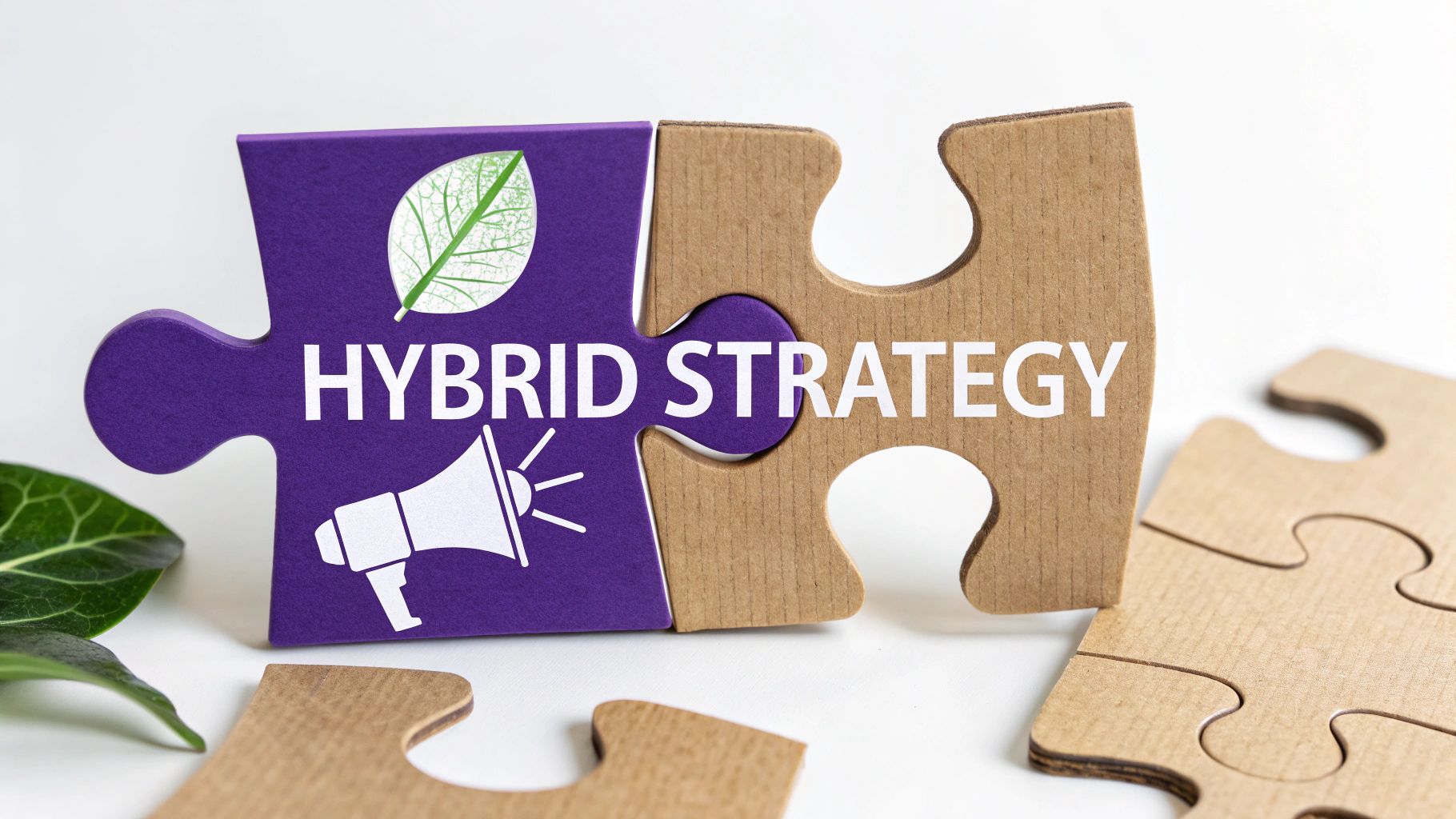
This integrated method lets you dominate the search results page, giving you a powerful combination of immediate momentum and long-term authority.
Letting Paid Data Guide Organic Growth
One of the biggest wins of a hybrid strategy is using the instant data from your PPC campaigns to steer your slower, more deliberate SEO efforts. Paid search is a fantastic testing ground.
You can quickly find out which keywords actually convert, which ad headlines resonate with your audience, and which landing pages get the job done. This isn't guesswork; it's real-world data that you've paid for, and it's incredibly valuable.
You can then feed this intelligence directly into your SEO strategy:
- High-Converting Keywords: If a keyword proves profitable in your PPC campaigns, it's an obvious candidate to target with long-form, optimised content for your organic efforts.
- Effective Ad Copy: The headlines and descriptions that get the most clicks in your ads can inspire your page titles and meta descriptions, which can seriously improve your organic click-through rates.
This feedback loop takes a lot of the uncertainty out of SEO, letting you focus your time and money on proven winners.
Reinforcing Your Brand with Full SERP Coverage
When you show up in both the paid and organic sections of a search result, you achieve what's known as full SERP (Search Engine Results Page) coverage. This has a powerful psychological effect on people.
Seeing your brand in multiple places builds a huge amount of credibility and trust. It sends a clear signal that you're a serious, authoritative player in your industry. This increased visibility doesn't just boost brand recognition; it also helps you capture clicks from users who might otherwise skip over paid ads or scroll right past the first few organic listings.
By combining SEO and PPC, you are no longer just a single result on a page; you are the dominant answer to a user's query. This unified presence can dramatically increase your overall traffic and conversions.
Creating a Balanced Investment Framework
Deciding how to split your budget between SEO and paid search really comes down to your business stage and what you're trying to achieve right now. To really succeed, it helps to have a solid digital marketing plan in place first, as a clear framework will guide your decisions. For some great pointers, you can find valuable insights in guides focused on building a powerful ecommerce digital marketing strategy.
Here’s a simple framework to help you find the right balance:
- New Business/Launch Phase: Put more of your budget towards paid search (70% PPC / 30% SEO) to generate immediate traffic and test the market. At the same time, you can get the foundational SEO work started in the background.
- Growth Phase: As your business starts to gain traction, you can move towards a more balanced split (50% PPC / 50% SEO). Use PPC to keep a steady flow of leads coming in while you scale up your content and link-building efforts.
- Mature Phase: Once your SEO is bringing in substantial organic traffic, you can ease off the paid ads (30% PPC / 70% SEO). At this stage, PPC becomes more of a strategic tool for specific promotions or to defend your brand keywords from competitors.
So, Which Path is Right for You?
Choosing between SEO and paid search isn't about finding one right answer; it's about figuring out what your business needs right now. The whole decision really comes down to three core questions that get to the heart of what you're trying to achieve commercially.
This isn't a theoretical "search engine marketing vs SEO" debate. It's about picking the right tool for the job to get real, tangible results for your business, whether you're based here in Cambridgeshire or anywhere else.
Your Decision-Making Checklist
Before you put any money down, have an honest think about these questions. The answers will pretty much point you in the right direction.
-
How quickly do you really need results? If you’re under pressure to hit sales targets this month, a sharp, targeted PPC campaign is your best bet for speed. But if you’re playing the long game and building for next year, putting your resources into SEO is a much smarter investment.
-
What's your immediate budget looking like? Paid search needs a consistent ad spend to stay visible. If you’ve got a predictable marketing budget (£500+ per month) ready to go, PPC is definitely on the table. If funds are tight but you can invest your own time, foundational SEO work will deliver far more value down the line.
-
What are your long-term ambitions? Are you trying to build a sustainable, cost-effective engine for leads that grows over time? Or do you need a tap you can turn on and off for specific promotions? SEO builds a valuable digital asset for your business, whereas PPC gives you that on-demand visibility.
Let's boil it down: If 'speed' and 'control' are shouting the loudest, start with paid search. If 'sustainability' and 'long-term authority' are what you're after, prioritise SEO. For most businesses, the sweet spot is a smart blend of both.
Get Your Complimentary SEO Health Check
Making a confident decision starts with good data. You need to know where you are right now to figure out how to get where you want to go. That’s exactly why we offer a completely free, no-strings-attached SEO Health Check for businesses just like yours.
This isn't some generic, automated report. It's a personalised analysis of your current organic performance, pinpointing the quick wins and technical gremlins that might be holding you back. Within 24 hours, you'll get a clear plan outlining exactly how you can improve your rankings and bring in more organic traffic.
Ready to take the first step towards a smarter search strategy? Get your free SEO Health Check today and let's build a plan that’s a perfect fit for your goals.
Your Burning Questions Answered
When it comes to search engine marketing and SEO, there are always a few questions that pop up. Here are some of the most common ones we hear from business owners across the UK, with straightforward answers to help clear things up.
Can I Just Do SEO Myself for My Small Business?
Honestly, you can definitely get started with the basics. But effective, long-term SEO is a massive time sink and requires some serious technical know-how. Google’s rulebook is constantly changing, and keeping up is a full-time job in itself.
For most small businesses, the reality is that partnering with a specialist agency is a much smarter use of your resources. It’s more efficient and almost always delivers better, more sustainable results in the long run.
Is SEM Just Another Name for Google Ads?
Not quite, though it’s an easy mistake to make. Search Engine Marketing (SEM) is the umbrella term for everything you do to get seen on search engines. That includes both the paid stuff, like Google Ads (PPC), and the organic side of things, like SEO.
That said, in everyday chats, you’ll often hear people use "SEM" when they’re really just talking about paid search. It's become a bit of a shorthand.
Which Is Better for a New Business with a Tiny Budget?
This all comes down to what you need right now. If you’re desperate for leads today and have a small budget you can control, a super-targeted local PPC campaign can work wonders. It’s fast and direct.
But if you’re playing the long game and have more time than cash, putting your efforts into solid, foundational SEO from day one is one of the wisest moves you can make for sustainable growth.
How Long Does It Really Take for SEO to Work?
You'll usually start seeing some real movement in your rankings and a noticeable uptick in traffic within about four to six months.
But let's be clear: SEO is a marathon, not a sprint. To achieve the kind of significant, authority-building results that truly make a difference—especially in competitive UK markets like Cambridgeshire—you’re looking at six to twelve months of consistent, focused work.
Ready to stop guessing and start growing? At Bare Digital, we provide a complimentary SEO Health Check and a transparent, tailored plan to get your business seen.


